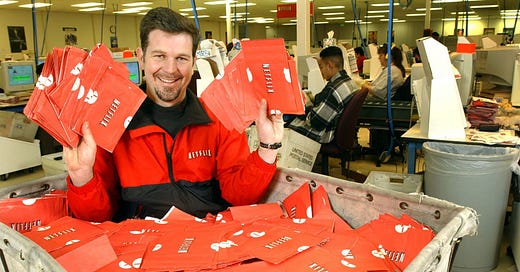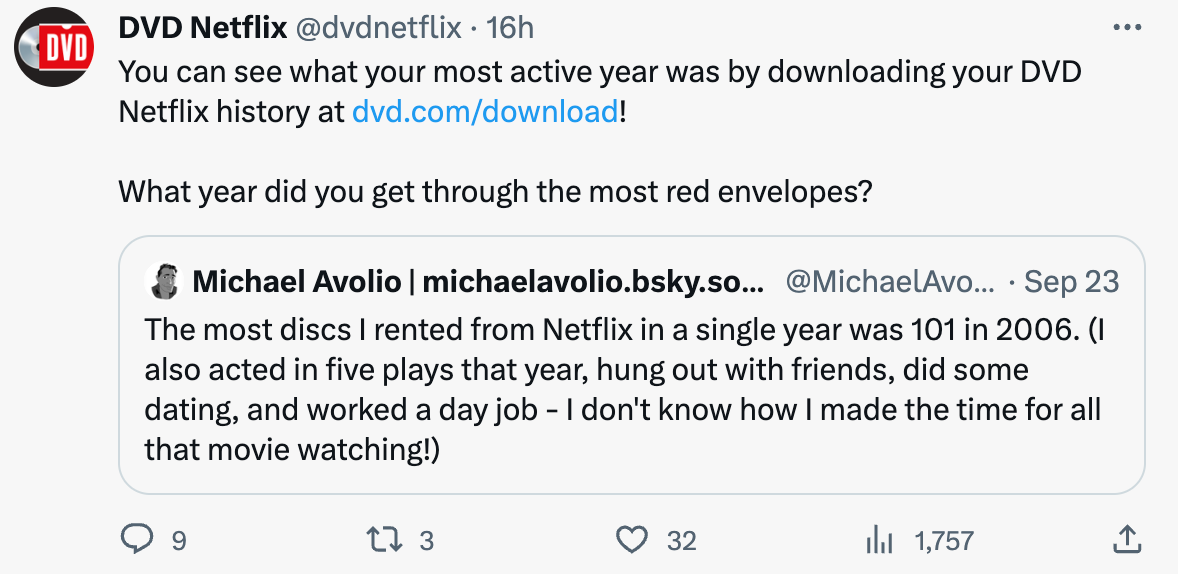Hello and welcome to the latest edition of Off to Lunch…
It is one of the most famous business transformations in history - how Netflix went from a business that rented-out DVDs by mail-order to a global streaming service that made its own TV shows and films, including House of Cards, The Crown and Squid Game.
That transformation will be complete tomorrow when Netflix stops sending out DVDs.
Many readers may be unaware that Netflix still rented-out DVDs, but it has a loyal collection of customers. The company has been posting messages on social media all week about people receiving their last DVDs in the post. It has also announced that customers will be able to keep any DVDs not returned after this Friday, September 29…
Netflix was founded in 1997 by Marc Randolph and Reed Hastings (who is pictured above and is still executive chairman). It quickly revolutionised how people rented-out films to watch at home by offering an online ordering service, next-day delivery and no late fees. Blockbuster, the rental store chain, filed for Chapter 11 bankruptcy protection in 2010 after its sales were decimated by the rise of Netflix. In total, Netflix has sent out more than 5 billion DVDs since it launched.
The Verge has done a fascinating piece on the history of Netflix DVDs. The piece looks at how an Irish company called Bronway helped to develop an automated machine for Netflix that packaged its DVDs, as you can see below…
Netflix started offering a streaming service for customers in 2007 and launched its first-ever original show - Lilyhammer - in 2012. House of Cards, arguably Netflix’s first mega-hit, launched in 2013. The company split its streaming and DVD services into separate subscription packages in 2011, which sparked a backlash among customers.
You can read the Verge piece here and find out more about the history of Netflix from the company itself here. Unsurprisingly, Netflix has been the subject of numerous business school case studies because of its pivot to streaming. You can find a study by Harvard Business School called “Netflix in 2011” here. It is available to buy for $8.95.
Netflix is valued at $170 billion (£139 billion) today. You can see from the share price graph below how the launch of the streaming service transformed the company…
Netflix announced that it was closing its DVD.com business in April. Ted Sarandos, the co-chief executive, said:
“Our goal has always been to provide the best service for our members but as the business continues to shrink that’s going to become increasingly difficult. So we want to go out on a high, and will be shipping our final discs on September 29, 2023.”
You can find that statement here
Other stories that matter…
1. Are we about to get the AI phone? The mystery product that OpenAI, Jony Ive and Softbank are looking to build is a phone, according to a story by the Financial Times, which you can read here. It appears that Arm, the UK chip designer backed by Softbank, could play a key role in this project. We covered the discussions between OpenAI, Ive and Softbank in yesterday’s Off to Lunch here
2. Trading in the shares of the giant Chinese property company Evergrande has been suspended following reports that its chairman and other senior executives have been detained by police. BBC story here
3. Artifact, the news app launched by the co-founders of Instagram, is adding new features that will allow users to post text and photos rather than just read news articles and share links. Artifact appears to be moving closer to Twitter’s traditional heartland. Story by The Verge here. Meanwhile, despite the innovation in the media industry, a 23-year-old social media influencer - Kelsey Russell - is reminding young people about the brilliance of newspapers and print media. Piece by Slate here
4. The New York Times has done an interesting piece on how Starbucks launched the pumpkin spice latte 20 years ago. The drink has become a Halloween tradition for Starbucks and is popular around the world. Peter Dukes, Starbucks director of market strategy, says: “We thought: ‘This one was so unique, give us a chance to develop what it tastes like in the cup.’ And you keep pulling the thread.” Piece here. Also on Starbucks, Laxman Narasimhan, the new chief executive, and former boss of FTSE 100 company Reckitt Benckiser, has spoken to the Wall Street Journal about the challenges facing the company. “Having worked as a partner [in a coffee shop], it’s clear to me that there are things that we need to do,” he said. Piece here
5. Lastly, The Wall Street Journal has looked at the challenges facing UK universities from an international perspective. “While U.S. universities charge ever higher tuition in an arms race for the best facilities and research, leading to a soaring student debt crisis, UK universities have the opposite problem. They aren’t able to charge enough.” You can read the full analysis here
And finally…
A year ago today the headline of Off to Lunch was “The Bank of England steps in.” September 28 2022 was the day that the Bank of England announced it would intervene in the gilt market and buy long-dated bonds amid chaos in financial markets following Liz Truss and Kwasi Kwarteng’s mini-Budget. You can find that edition here.
For more on what happened last September, I recommend watching the BBC documentary Laura Kuenssberg: State of Chaos. The three-part series looks at UK politics since 2016 - specifically the demise of David Cameron, Theresa May, Boris Johnson and Liz Truss - through a collection of interviews with senior politicians and civil servants. You can find that series here
Thanks for reading. If you enjoy Off to Lunch then please share it with others and spread the word. If this newsletter was shared with you then please sign-up below to become a member, get Off to Lunch sent directly to your inbox, and contribute to the work of Off to Lunch
Best
Graham










